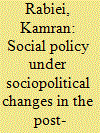| Srl | Item |
| 1 |
ID:
173975


|
|
|
|
|
| Summary/Abstract |
Political developments, such as the ‘Arab Spring’, have led the Middle East and North Africa (MENA) towards instability, unrest and severe sectarian confrontations. Nearly 2 years before the ‘Arab Spring’, ‘the Iranian Green Movement’ swept over the country and led to the expectations that Iran would undergo a fundamental political change. The article addresses an important question as to why the 2009 Iranian unrest known as the ‘Green Movement’ did not lead to regime change, while on the other hand, the ‘Arab Spring’ ultimately led to the change of political systems in Tunisia and Egypt. Further, some significant factors are highlighted anticipating the degree of stability and instability for the future of political regimes in the MENA region.
|
|
|
|
|
|
|
|
|
|
|
|
|
|
|
|
| 2 |
ID:
164476


|
|
|
|
|
| Summary/Abstract |
The dialectic relation between sociocultural changes and political developments in the post-revolutionary Iran is discussed in the article which shows how the social policy of the governments has changed under this relation. The 1979 Islamic Revolution brought about a wave of tendency toward a specific discourse that can be called “downtrodden discourse” wherein the poor and deprived are the center of attention, and the resources of society are mainly mobilized in the direction of improving their economic and social conditions. Furthermore, the eight-year Iran–Iraq War (1980—1988) strengthened this discourse, and the new political system relied on the lower class of the society to push the war forward, stabilize the foundations of its power, and solidify its ideology. After the war, Iran had three governments with three different approaches toward social policy. During the era of Hashemi Rafsanjani (1989–1997), no special attention was paid to social policy since economic growth and development was the focus of the government activity. Under Mohammed Khatami (1997–2005), special attention was paid to comprehensive social policy, but due to internal political and social tensions, his government failed to implement its codified social policy. Although Ahmadinejad (2005–2013) intended to pay special attention to social policy, the actions taken by his government not only failed to reduce poverty but they also pushed the significant part of the middle class below the poverty line.
|
|
|
|
|
|
|
|
|
|
|
|
|
|
|
|